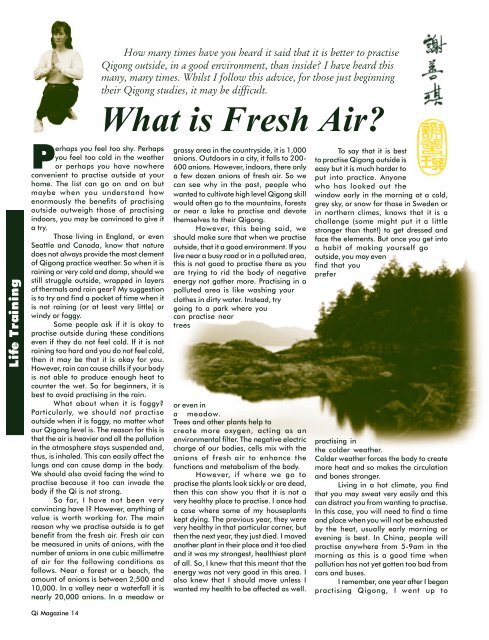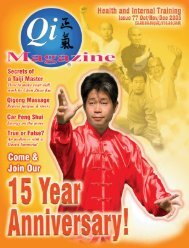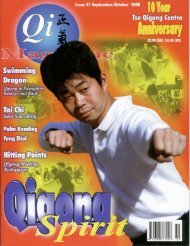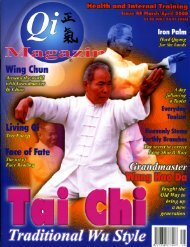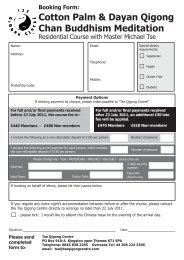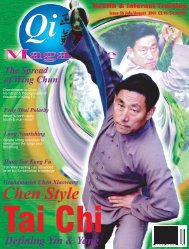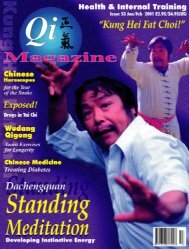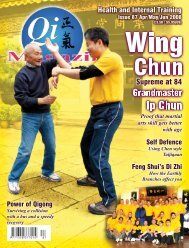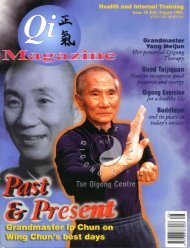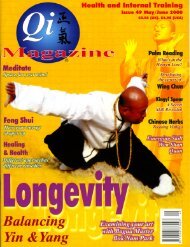Issue 54 - Tse Qigong Centre
Issue 54 - Tse Qigong Centre
Issue 54 - Tse Qigong Centre
- No tags were found...
Create successful ePaper yourself
Turn your PDF publications into a flip-book with our unique Google optimized e-Paper software.
How many times have you heard it said that it is better to practise<strong>Qigong</strong> outside, in a good environment, than inside? I have heard thismany, many times. Whilst I follow this advice, for those just beginningtheir <strong>Qigong</strong> studies, it may be difficult.What is Fresh Air?Life TrainingPerhaps you feel too shy. Perhapsyou feel too cold in the weatheror perhaps you have nowhereconvenient to practise outside at yourhome. The list can go on and on butmaybe when you understand howenormously the benefits of practisingoutside outweigh those of practisingindoors, you may be convinced to give ita try.Those living in England, or evenSeattle and Canada, know that naturedoes not always provide the most clementof <strong>Qigong</strong> practice weather. So when it israining or very cold and damp, should westill struggle outside, wrapped in layersof thermals and rain gear? My suggestionis to try and find a pocket of time when itis not raining (or at least very little) orwindy or foggy.Some people ask if it is okay topractise outside during these conditionseven if they do not feel cold. If it is notraining too hard and you do not feel cold,then it may be that it is okay for you.However, rain can cause chills if your bodyis not able to produce enough heat tocounter the wet. So for beginners, it isbest to avoid practising in the rain.What about when it is foggy?Particularly, we should not practiseoutside when it is foggy, no matter whatour <strong>Qigong</strong> level is. The reason for this isthat the air is heavier and all the pollutionin the atmosphere stays suspended and,thus, is inhaled. This can easily affect thelungs and can cause damp in the body.We should also avoid facing the wind topractise because it too can invade thebody if the Qi is not strong.So far, I have not been veryconvincing have I? However, anything ofvalue is worth working for. The mainreason why we practise outside is to getbenefit from the fresh air. Fresh air canbe measured in units of anions, with thenumber of anions in one cubic millimetreof air for the following conditions asfollows. Near a forest or a beach, theamount of anions is between 2,500 and10,000. In a valley near a waterfall it isnearly 20,000 anions. In a meadow orgrassy area in the countryside, it is 1,000anions. Outdoors in a city, it falls to 200-600 anions. However, indoors, there onlya few dozen anions of fresh air. So wecan see why in the past, people whowanted to cultivate high level <strong>Qigong</strong> skillwould often go to the mountains, forestsor near a lake to practise and devotethemselves to their <strong>Qigong</strong>.However, this being said, weshould make sure that when we practiseoutside, that it a good environment. If youlive near a busy road or in a polluted area,this is not good to practise there as youare trying to rid the body of negativeenergy not gather more. Practising in apolluted area is like washing yourclothes in dirty water. Instead, trygoing to a park where youcan practise neartreesor even ina meadow.Trees and other plants help tocreate more oxygen, acting as anenvironmental filter. The negative electriccharge of our bodies, cells mix with theanions of fresh air to enhance thefunctions and metabolism of the body.However, if where we go topractise the plants look sickly or are dead,then this can show you that it is not avery healthy place to practise. I once hada case where some of my houseplantskept dying. The previous year, they werevery healthy in that particular corner, butthen the next year, they just died. I movedanother plant in their place and it too diedand it was my strongest, healthiest plantof all. So, I knew that this meant that theenergy was not very good in this area. Ialso knew that I should move unless Iwanted my health to be affected as well.To say that it is bestto practise <strong>Qigong</strong> outside iseasy but it is much harder toput into practice. Anyonewho has looked out thewindow early in the morning at a cold,grey sky, or snow for those in Sweden orin northern climes, knows that it is achallenge (some might put it a littlestronger than that!) to get dressed andface the elements. But once you get intoa habit of making yourself gooutside, you may evenfind that youpreferpractising inthe colder weather.Colder weather forces the body to createmore heat and so makes the circulationand bones stronger.Living in a hot climate, you findthat you may sweat very easily and thiscan distract you from wanting to practise.In this case, you will need to find a timeand place when you will not be exhaustedby the heat, usually early morning orevening is best. In China, people willpractise anywhere from 5-9am in themorning as this is a good time whenpollution has not yet gotten too bad fromcars and buses.I remember, one year after I beganpractising <strong>Qigong</strong>, I went up toQi Magazine 14


